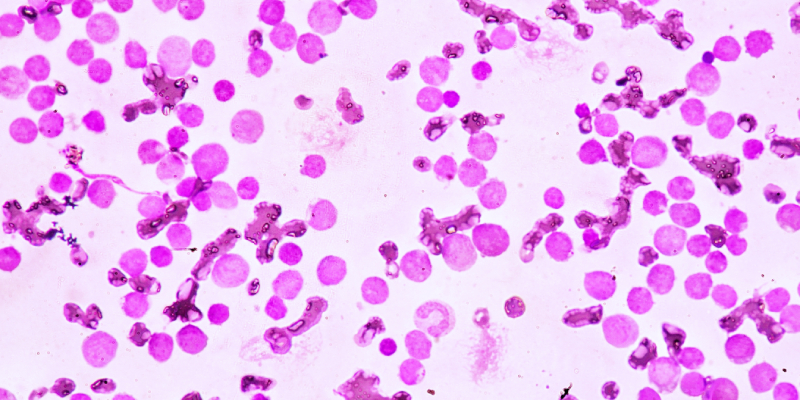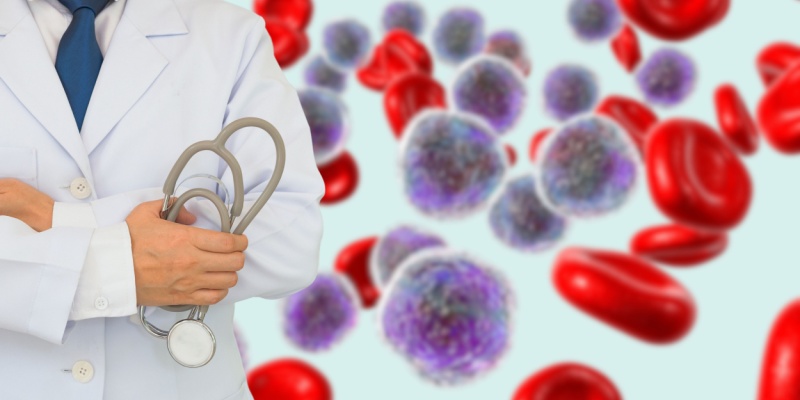
The triplet combination of decitabine, venetoclax, and ponatinib was well tolerated in patients with chronic myeloid leukemia (CML) in myeloid blast phase or Philadelphia (Ph) chromosome-positive acute myeloid leukemia (AML), according to an ongoing phase II study presented at the 2022 American Society of Hematology Annual Meeting.
The single-arm study was led by Jayastu Senapati, MD, MBBS, DM, of the Department of Leukemia at the University of Texas MD Anderson Cancer Center. The senior author of the paper is Nicholas Short, MD, of the University of Texas MD Anderson Cancer Center.
The primary objective of the study was to determine the overall response rate of the triplet regimen.
The trial enrolled adults (median age, 45 years; range, 28-71 years) with newly diagnosed or relapsed/refractory advanced-phase CML or Ph-positive AML. Patients were excluded if they had clinically significant cardiovascular comorbidities, including recent or active myocardial infarction, heart failure, clinically significant arrhythmias, cerebrovascular accident, venous thromboembolism, or uncontrolled hypertension.
From July 2020 to May 2022, 12 patients were treated with a combination of decitabine 20 mg/m2 for five days, venetoclax 400 mg equivalent dose daily for 21 days, and ponatinib 45 mg daily for 21 days in cycle one and then continuously in cycles two and beyond.
Ponatinib was reduced to 30 mg daily for patients in complete remission (CR) or CR with incomplete hematologic recovery (CRi) and to 15 mg daily for patients in complete molecular response. For cycle one only, patients who had not received ponatinib prior to the initiation of the trial had a lead-in phase of ponatinib monotherapy for seven days before the initiation of decitabine and venetoclax. Cycles were repeated every 28 days, as permitted by peripheral blood count recovery, and patients could receive a maximum of 24 cycles, according to Dr. Senapati and colleagues.
After a median follow-up of 9.1 months, median overall survival (OS) was 9.5 months, and the estimated nine-month OS was 64%. The median relapse-free survival was 5.1 months.
Of the patients treated with the triplet combination, nine (75%) responded, including one with CR, three with CRi, and five with morphologic leukemia-free state (MLFS) as best response. The CR/CRi rate was 33%. The 60-day mortality rate was 0%.
Only one patient had Ph-positive AML, while the rest had advanced-phase CML, two of whom exhibited no response. Among the nine CML responders, three were in continuous response without allogeneic hematopoietic stem cell transplantation (HSCT), one proceeded to HSCT and is still alive, three did not undergo HSCT and relapsed (two of whom had a complex karyotype), one died in MLFS remission, and one was lost to follow-up.
The toxicity profile of the regimen was similar to historical expectations with decitabine plus venetoclax, Dr. Senapati and colleagues noted. No grade 4/5 non-hematological adverse events were observed. Of the eight patients who received more than once cycle, four had a delay of more than one week of the initiation of a subsequent treatment cycle due to cytopenias; for two of the patients, the duration of venetoclax was reduced.
“The triplet combination of [decitabine, venetoclax,] and ponatinib was well tolerated in patients with advanced Ph-positive myeloid leukemias,” the investigators wrote. “In this poor-risk population, a marrow remission rate of 75% was achieved, although durations of remission were modest in the absence of consolidative HSCT.”
Reference
Senapati J, Ravandi F, DiNardo C, et al. A phase II study of the combination of decitabine, venetoclax and ponatinib in patients with chronic myeloid leukemia (CML) in myeloid blast phase (MBP) or Philadelphia-chromosome positive (Ph+) acute myeloid leukemia (AML). Abstract #1689. Presented at the 64th ASH Annual Meeting and Exposition; December 10-13, 2022; New Orleans, Louisiana.






 © 2025 Mashup Media, LLC, a Formedics Property. All Rights Reserved.
© 2025 Mashup Media, LLC, a Formedics Property. All Rights Reserved.